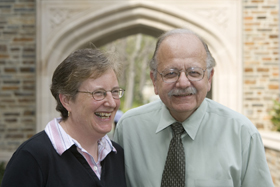Naming Evil
New book asks whether addressing evil helps or hinders in taking action

How do we define evil? How do we confront evil in our own lives? How does the use of the word "evil" sometimes become skewed or politicized?
These are some of the questions addressed in Naming Evil, Judging Evil, a new book written collaboratively by nine Duke faculty from a range of disciplines, including history, political science and philosophy. Ruth Grant, professor of political science and a senior fellow at the Kenan Institute for Ethics, spearheaded the project and served as editor. Former Duke President Nannerl O. Keohane also contributed a chapter.
From Naming Evil
"Yet why speak of evil at all? Why is it not enough to speak of good and bad rather than good and evil? The contributors to this volume suggest several possible answers. Let me add to their suggestions one more, but begin with a warning of dangers to be avoided. One such arises from the current climate of political incivility in the United States, which permits both liberal and conservative agitators to employ types of rhetoric that debase the linguistic currency and make it easy to use the word ‘evil' lightly, promiscuously, and irresponsibly. This kind of corruption of speech is itself a great evil."
-- Excerpted from Foreword by Alasdair MacIntyre
The idea for the book grew out of Grant's own interest in the topic. She knew it was on the minds of her colleagues, based on conversations and reading papers they had written.
Since the September 2001 terrorist attacks, a number of issues have arisen in terms of addressing evil, Grant said. She found people asking, "Is it more dangerous to speak of evil or not to?" While some people believe the term is used too casually, others worry that issues such as terrorism and genocide must be acknowledged as evil before they can be addressed.
"People seem to be paralyzed or confused about confronting moral questions in politics, particularly in the face of a growing emphasis on cultural differences with respect to moral questions," Grant said. "At the same time, the prevalence of political and moral evils in the world is clear. There seems to be a disjunction between our experience and our vocabulary for dealing with that experience."
For a year and a half, Grant and many of the other faculty members met regularly for lunchtime discussions, and the process culminated in a conference where scholars in many disciplines from outside Duke came to comment on draft chapters.
The group of faculty brought a blend of mutual respect and substantive differences that brought a sense of balance to the book, Grant said.
Each author contributed his or her opinions and approaches to each chapter, she said. Chapters cover such diverse areas as the historical sources of current dilemmas and practical approaches to reaching sound judgments in cases of cross-cultural conflict. They also explore both sides of moral dilemmas, such as the dangers of moral righteousness and the dangers of complacency.
Peter Euben, the Kenan Distinguished Faculty Fellow, wrote the chapter "The Butler Did It," in which he discusses the concept of a man who is striving to be good but ultimately cedes his moral agency to his master. Euben compares that to the American people, who tend to elect a president and then expect their leader to do the rest -- relinquishing their own sense of moral responsibility in deference to the decisions the country's leader makes.
He said all citizens have a responsibility to be aware of the moral dilemmas around them, to examine the moral values of others and to try to understand why they have those values, and they have accountability for decisions made in their name. On the question of whether ignorance alleviates accountability, Euben argues, "Sometimes, it doesn't."
Euben said he hopes people will come to see not only the difficulty of making moral judgments but also the necessity of making such judgments. He also hopes they might ask themselves what kind of culture or society would minimize the likelihood that "ordinary people would commit horrendous acts."
Grant hopes readers will be challenged by the book, coming to see the other side of their own positions or see a position in a way they had not seen it before.
"All of us need to have moments where we step back and look at judgments and ideas," she said.
She also hopes readers will come to see issues less in black and white.
"I would hope that there are some 'ah ha' moments," Grant said.
Naming Evil, Judging Evil was supported by the Provost's Common Fund; the Kenan Institute for Ethics; and the Gerst Program in Political, Economic and Humanistic Studies. The book is available through the University of Chicago Press.